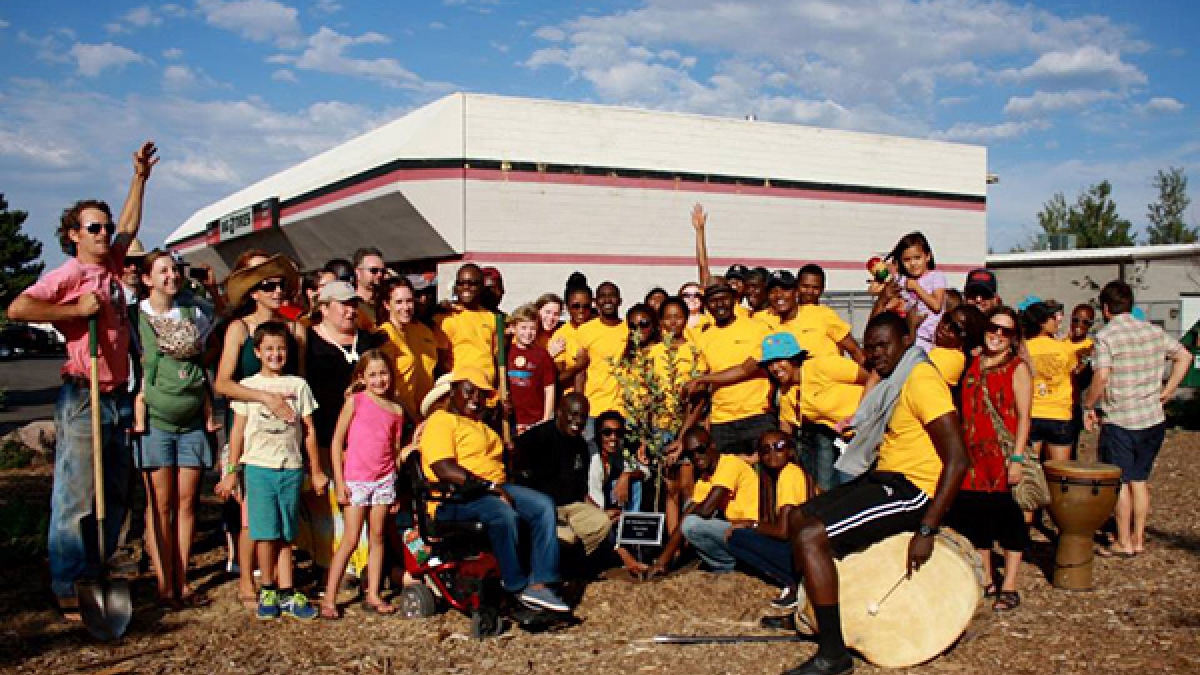ASU to host Mandela Washington Fellows from Africa

The 2014 Mandela Washington Fellows meet with Flagstaff-based Terra BIRDS to plant a community garden together.
For the second year, Arizona State University has been selected as one of 20 leading U.S. universities to serve as an academic Institute for the Mandela Washington Fellowship for Young African Leaders, the flagship program of President Obama’s Young African Leaders Initiative (YALI).
Led by the College of Public Service and Community Solutions, ASU will host 25 accomplished young professionals for a six-week civic leadership institute starting later in June. The program is oriented to young leaders from sub-Saharan Africa who serve the public through non-governmental organizations, community-based nonprofits or volunteerism.
“We are pleased to again be a part of this exciting initiative. Through our strengths in civic leadership and social entrepreneurship, we are not only helping to spur creative problem-solving, but are making the connections that will result in real solutions on a global scale,” said Jonathan Koppell, dean of the College of Public Service and Community Solutions.
Fellows will meet with faculty from across the university, as well as community advocates and practitioners. The College has partnered with dozens of institutions to provide this group a comprehensive experience: City of Phoenix, Local First Arizona, International Rescue Committee, the Navajo and Hopi tribal communities, Grand Canyon Trust, Terra BIRDS, City of Tucson, City of Flagstaff, National Parks Service and more.
Participants will travel to Tucson to meet with city government, visit Kartchner Caverns and work on a community service project in conjunction with ASU’s School of Social Work, Tucson, and a local domestic-violence facility. They will spend two weeks in Flagstaff meeting with local agencies and visiting the Grand Canyon. Additional visits include local American Indian reservations, Sedona and Clarkdale.
“The practitioner approach from which the program was taught and willingness of lecturers to adapt presentations to the needs of Africa was simply awesome,” said Benjamin Freeman Jr., executive director of the Liberia Institute for the Promotion of Academic Excellence (LIPACE) and 2014 Mandela Washington Fellow.
Through LIPACE, Freeman hopes to turn around an 82 percent 12th-grade dropout rate in his country.
Freeman says the inspirational mentors and contacts made during the program helped him achieve his goal of “producing the first post-war study guide for secondary students sitting annual exams.”
John Taylor, executive director of Terra BIRDS, says the Washington Fellows who joined Terra BIRDS at Ponderosa High School last summer were "a truly amazing and inspiring group of leaders. I expect the same this summer.”
“I wholeheartedly believe that humans have the ability to successfully address the many social and environmental challenges that face us today; and we have the potential to thrive and co-exist with each other and the amazing diversity of other life on our planet far into the future," Taylor said.
"But we need to make the choice to do so, adjust our daily habits, and take collaborative action with fellow humans who share this vision. The Washington Fellows are shining examples of people we want to partner with as leaders in this movement to support health, happiness and a bright future for all life.”
President Obama launched YALI in 2010. Through this initiative, emerging leaders are gaining the skills and connections they need to accelerate their own career trajectories and contribute more robustly to strengthening democratic institutions, spurring economic growth and enhancing the peace and security in Africa.
Working closely with the U.S. Department of State’s Bureau of Educational Affairs and its implementing partner, IREX, host institutions have designed academic programs that will challenge, inspire and empower these inspiring young leaders from Africa.
The Fellowship serves as the beginning of their training. The U.S. government has a long-term investment in YALI, planning to work with institutions and the next generation of African entrepreneurs, educators, activists and innovators to create meaningful opportunities in Africa.